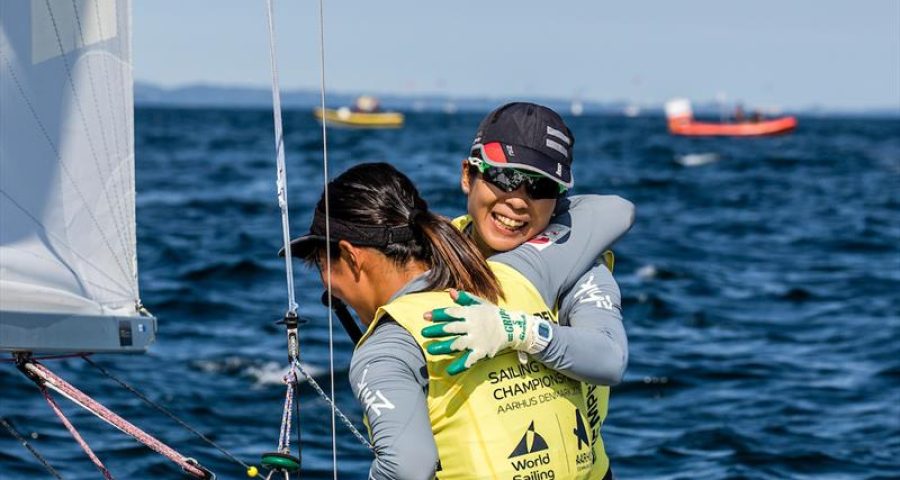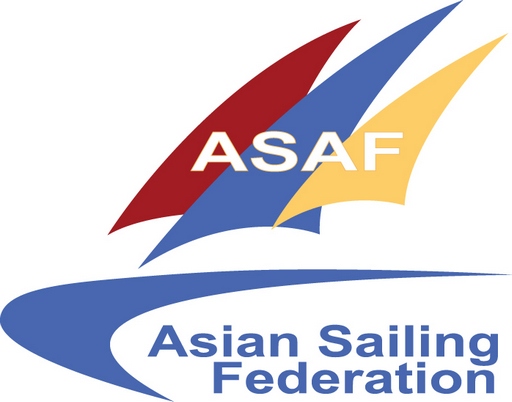
The tears rolled down Zsomber Berecz’s face as he crossed the finish line in Denmark’s beautiful Bay of Aarhus on Thursday to win the Finn and Hungary’s first ever medal in one of these quadrennial sailing world championships. It was the first gold medal to be awarded at these Hempel Sailing World Championships Aarhus 2018 and Berecz’s emotions were heightened by the fact that it has been a long time coming – for him and his country.
“I’m a human being and I know what it means for me, my team and my country. It is a big achievement,” Berecz said.
However hard it was for Sweden’s silver medallist, Max Salminen, who had led by eight points going into today – day 8 – after an exhausting victory in the storm late on Wednesday evening, it was hard not to feel that there was some kind of karma behind Berecz’s gold.
The 32-year-old Berecz had been lying second after only made his comeback six weeks ago following four months out with a thumb he broke in a freak accident whilst doing a good deed for a fellow sailor.
“I had a great day training in Cadiz (before the Europeans in March),” Berecz said. “I was so pumped up and on the way home, I saw some hiking (wetsuit) pants fall off the van in front of me. I stopped with my bike, I grabbed it and I saw they stopped at the next roundabout, so I was going full speed to reach them to give it back, and the leg of the wetsuit got caught in the front wheel and stopped it completely and I made a front-flip, and I broke my thumb.
“If you would’ve said at the start of the Championship that I will win it, I wouldn’t believe you. I had four months off, and it was a tough four months. I only had one and half months of training before these worlds, but I spent it really well and it worked out.”
Berecz is fast rewriting Hungary’s sailing records. He won silver at the 2016 Europeans in Barcelona and that was only the second medal ever for Hungary at major Finn championships.
The equation for gold had been simple for Salminen; he led by eight points and if he finished fourth or better was guaranteed gold (and to defend the Finn Gold Cup he won in 2017), but he could only finish seventh and was never above fifth.
Berecz and the Netherland’s Pieter-Jan Postma were a class apart in this battle of the giants – the biggest sailors at the World Championships at 6ft 2in up and between 95-110kg. They escaped during the first beat and were never caught as the rest of the fleet fought for air. The front two – training partners for the last fortnight in Aarhus – pulled away in the nine-knot south-easterly breeze and Postma leapt from sixth overnight to take bronze from New Zealand’s Josh Junior.
After only making his comeback from retirement two months ago, Postma, 36, was almost as happy as Berecz. It will have been doubly sweet because he won his national battle within the battle against Nicholas Heiner, 29, who started the day fourth but could only finish eighth in the medal race. Heiner will have to console himself that he finished sixth overall and thus inside the top 8 that the Netherlands strict selection criteria laid down to keep selection for the 2020 Tokyo Olympics open.
There was greater heartbreak for Sweden in the men’s 470. The Swedish 2018 European Champions, Anton Dahlberg, and Frederik Bergström, had led by six points overnight – after leading all week – and third place or better would have guaranteed gold. They came last and slipped out of the medals entirely.
Having started the day third overall, France’s Kevin Peponnet and Jermie Mion finished third in the medal race and that was enough for gold. Tetsuya Isosaki and Akira Takayanagi – one of nine Japanese men’s 470 teams in Aarhus and one of three in the medal race – started the day second (albeit level on points with the French) and took silver by finishing fifth. Spaniards, Jordi Xammar Hernandez and Nicolás Rodriguez Garcia-Paz, who had started the day in fifth, 14 points behind the Swedes, took a surprise bronze after a magnificent second-place in the medal race.
“It was so intense. My heart is still beating so hard. That was the hardest race I’ve ever sailed in my life,” Peponnet said. “The hardest bit of the race for me was to catch the other guy. To focus on your speed, with all the waves and chaos around you, it’s very hard.
“The goal (this week) was to be less than 10 points from the leader, for a chance to win the title. We managed to keep that distance between the first place and us all week long. When an opportunity comes, you can grab it and that is what we’ve done, and we’ve won the title.”
The Swedes were understandably disconsolate. “We didn’t execute the medal race we wanted and…yeah…as bad as it could get probably,” Dahlberg said.
The women’s 470 – the third medal race of the day – had smaller surprises. Japan’s Ai Kondo Yoshida and Miho Yoshioka underlined Japan’s strength in the 470 class by winning a relatively comfortable gold. They started the day top and finished fifth in the medal race but they had done their maths and kept France’s Camille Lecointre and Aloise Retornaz, bronze medallists at the 2016 Rio Olympics ahead of the Japanese crew in fifth, behind them. The French slipped to seventh – in the end, sixth would have been enough for bronze, so close were the margins.
“We were very nervous at the beginning of today because we were in first place,” Yoshida said. “I felt a lot of pressure, but finally I got a gold. The medal race was the hardest of the week, it was very close, but we weren’t worried when the British passed us because we had worked out the mathematics.”
Hannah Mills, the Rio 2016 Olympic champion and her new crew, Eilidh McIntyre, took bronze but it could have been silver had they not lost around 15 seconds after confusion over who had been OCS at that start. The Slovenians were over the line, but the two British teams, uncertain of their status, went back when they did not need to.
Mills and McIntyre powered back to seventh at the top mark and fourth at the finish, but the Spaniards Silvia Mas Depares and Patricia Cantero Reina, who had started the day in fourth, led from start to finish and took silver to make it an unexpectedly great day for Spain.
Laser
In the men’s Laser, Pavlos Kontides (CYP) holds the top spot, discarding his last race. Matthew Wearn (AUS) seemed to have a bad day but finishes the day in second. Elliot Hanson (GBR) moves up to third.
Sam Meech (NZL), and Australian, Tom Burton both dropped positions after being protested, more information can be found on the online Noticeboard.
Laser Radial
Belgium’s Emma Plasschaert leads the women’s Radial with an 11-point cover over Marit Bouwmeester (NED), who is second. Anne-Marie Rindom (DEN) didn’t particularly have a great day on the water but she holds third place.
Nacra
Australian siblings, Nathan and Haylee Nathan Outteridge claim top spot overnight. Christian Peter Lübeck & Lin Ea Cenholt (DEN) are second and Santiago Lange and Cecilia Carranza Saroli (ARG) move down to third.
RS:X Men
The men’s RS:X races were live today, click here to watch the races. Dorian van Rijsselberghe (NED) tops the leaderboard, with Pawel Tarnowski (POL) in second, and Kieran Holmes-Martin (GBR) in third place.
RS:X Women
The Dutch windsurfer, Lilian de Geus leads by 5 points ahead of Yunxiu Lu (CHN), in second. Zofia Noceti-Klepacka drops to third.
Men’s 49er
Sime and Mihovil Fantela lead in the 49er class, and Germany’s Tim Fischer and Fabian Graf hold second place. Erik Heil & Thomas Ploessel, also from Germany are third.
Women’s 49erFX
Austria’s Tanja Frank and Lorena Abicht are first, and Great British, Sophie Weguelin and Sophie Ainsworth are second, Annemiek BekkeringAnnette Duetz (NED) is third in the 49erFX class.
Men’s Kiteboard
Nicolas Parlier (FRA) leads in the men’s Kiteboard, with a 4-point lead ahead of Guy Bridge (GBR). Theo de Ramecourt (FRA) sits in third.
Women’s Kiteboard
In the women’s Kiteboard fleet, Daniela Moroz (USA) holds top spot overnight, with Russian, Elena Kalinina in second. Alexia Fancelli (FRA) is third.
Full results for each fleet can be found here.
by Matthew Pryor

